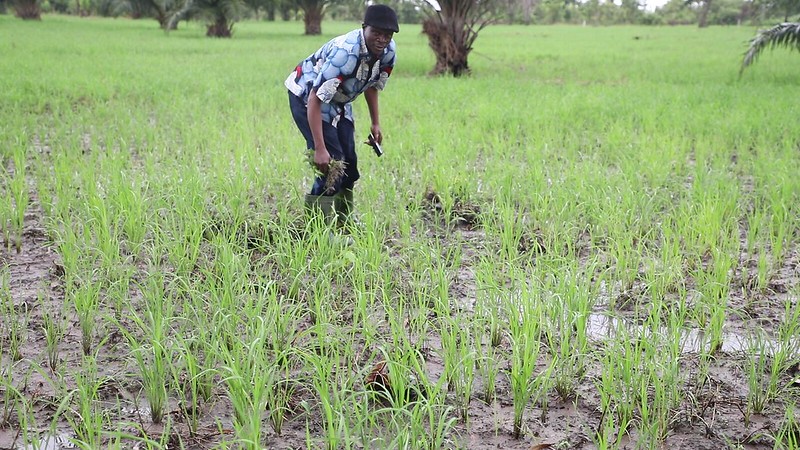
It was a cool and breezy evening in Koba.
Abou Camara sat in his reclining chair, with the gentle breeze caressing his bearded face and unveiling the palpable feeling of satisfaction and happiness emanating from his being.
Abou, a renowned rice farmer in Koba, a town in the Télimélé Prefecture in the Kindia Region of western-central Guinea, is in high spirits following a recent discovery on his farm. This discovery will change his socio-economic status forever!
With experience in rice farming from 1998, Abou has planted several rice seed varieties on his farm.
Each year, his hope for a bumper harvest gets shattered by flooding occasioned by fluctuating weather patterns in his region.
In 2016, Abou acquired and planted the NERICA L19 variety, but little did he know that the variety does not have the flood-tolerant submergence gene, and when the floods came, he lost nearly all he planted that season.
In 2019, Abou participated in a farmer field school organised by Technologies for African Agricultural Transformation (TAAT) in collaboration with the AfricaRice Centre and some seed enterprises. He was introduced to new climate-smart varieties: NERICA L19sub1, WITA 4sub1, Mbapeya, and ROK5.
Upon planting the new NERICA L19sub1 and WITA 4sub1 seeds in the subsequent season with strict observance of good agronomic practices, Abou discovered that the seeds he planted had a flood-tolerant gene.
He noticed that these varieties could tolerate flooding when it occurred at the vegetative stage on his farm for a period of 10 days, and yet the crop was able to show normal growth.
“Both NERICA L19sub1 and WITA 4sub1 showed high promise of a very good harvest despite the flooding in my farm. Accessing these varieties has made a huge difference in my life, and I am happy because this year’s harvest will be my biggest one so far,” Abou said.
“This is something I have never experienced with other varieties.
I am proud of this scientific achievement. Indeed, with science, we can overcome,” he added.
To reduce the negative effects of climate change on rice production and paddy quality, the African Development Bank, through the TAAT programme, is scaling the adoption of improved climate-resilient rice varieties across Africa.
This will ensure that seed enterprises and farmers can access elite rice varieties adapted to adverse weather conditions like erratic rainfall, flooding, and droughts.
In this regard, TAAT and AfricaRice, working with the Africa-wide Rice Breeding Task Force, have developed varieties tolerant to key biotic and abiotic stresses.
NERICA L19sub1 (submergence/flood-tolerant at the vegetative stage), aromatic ORYLUX 6 (Basmati group of rice), which are recognized for their excellent grain quality, taste, and early maturing, and hybrid ISRIZ 09 (AR051H) with excellent grain quality (long grain with firm texture) and good taste form part of the latest generation of rice varieties for Africa.
These new mega varieties are suitable for rain-fed lowland ecology with limited or no water control and irrigated ecology where water control is practised.
Yields of up to 7 tons per hectare have been obtained with the inbred, while the hybrid recorded 9.9 t/h under farmer conditions in the Senegal River Valley.
To further scale these varieties across Africa and reach millions of farmers using the time-tested private sector-led and profit-oriented pathway, TAAT, in partnership with the African Seed Trade Association (AFSTA), has established the African Cereal and Legume Breeding Consortium (ACLBC).
Launched in Mombassa, Kenya, during the 2024 AFSTA Congress, ACLBC represents a contemporary step towards an integrated approach that builds on years of experience in plant breeding, agronomic research, and seed system development in Africa.
Within months, the consortium is already facilitating the sharing of genetic resources and breeding techniques for superior crop varieties with private seed companies while serving as an incubator for innovation in plant breeding technologies.
The cereal and legume-based consortium provides seed companies with high-yielding and climate-resilient seeds and access to three exclusive varieties/hybrids of Rice, Maize, Wheat, Sorghum, Millet, Soybean, and particular crops, including the High-Iron Beans (HIB).
Consortium members will have a Lead Access Period of 24 months exclusivity, subject to the technology provider’s material transfer arrangements to commercialise these varieties/hybrids.
To achieve its objectives in a transformative way, ACLBC prioritises assisting the seed companies in developing their varieties/hybrids, providing technical assistance to seed companies to conduct multi-location adaptability tests of new varieties/hybrids, and strengthening the capacity of seed companies in hands-on seed production and maintenance techniques with an emphasis on hybrids to be well-positioned to reach farmers like Abou Camara all over Africa.
Indeed, farmers are not averse to the uptake of new rice varieties.
They require access to these varieties facilitated on the wheels of affordability, availability, and profitability, which is represented by the private sector interface of the African Cereal and Legume Breeding Consortium.











